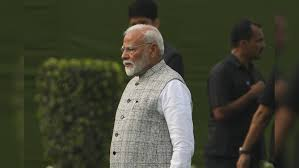
Table of Contents
The Context
The Global South, encompassing nations in Africa, Latin America, and parts of Asia, represents a diverse group of countries that often face common challenges, including poverty, underdevelopment, and vulnerability to global economic fluctuations. These nations, while rich in resources and potential, frequently struggle with systemic issues that hinder their growth and development. In this context, Prime Minister Modi’s address sought to rally these countries into a united front, advocating for a concerted approach to overcoming these hurdles.
Key Challenges Identified
1. Economic Disparities: One of the central themes of Modi’s speech was the economic inequality that persists globally. The Prime Minister highlighted the growing divide between developed and developing nations, exacerbated by factors such as trade imbalances, debt burdens, and limited access to global markets. Modi called for fairer trade practices, debt relief initiatives, and increased investment in the Global South to foster economic growth and reduce poverty.
2. Climate Change: Climate change is another pressing challenge that disproportionately affects developing countries. Modi underscored the vulnerability of these nations to extreme weather events, rising sea levels, and environmental degradation. He advocated for a global response that includes increased support for climate adaptation and resilience projects, technology transfer, and financial assistance to help developing countries mitigate the impacts of climate change.
3. Public Health: The COVID-19 pandemic highlighted significant gaps in global health infrastructure, particularly in the Global South. Modi stressed the need for strengthening health systems, improving access to vaccines, and ensuring that medical resources and technologies are equitably distributed. He proposed a collaborative approach to enhancing global health security and addressing future health crises.
Call for Unity and Collective Action
1. Reframing the Global Discourse: Modi’s address was notable for its emphasis on reframing the global discourse around the challenges faced by developing nations. He urged the Global South to advocate for their interests more effectively on the international stage and to work together to influence global policies and decisions. Modi’s vision was one of empowerment and self-determination, where developing countries play a central role in shaping the global agenda.
2. Strengthening Multilateral Institutions: Modi called for a revitalization of multilateral institutions to better reflect the interests and needs of the Global South. He argued that institutions such as the United Nations, the World Trade Organization, and the International Monetary Fund should be reformed to provide more equitable representation and support to developing countries. The Prime Minister emphasized the need for these institutions to be more responsive and accountable to the diverse challenges faced by the Global South.
3. Fostering South-South Cooperation: A significant portion of Modi’s speech was dedicated to the concept of South-South cooperation. He highlighted the potential for countries within the Global South to collaborate and share knowledge, resources, and best practices. Modi pointed to existing successful partnerships and encouraged the expansion of such initiatives to address common challenges. He advocated for increased investment in regional integration and cooperation frameworks to leverage the collective strength of developing nations.
India’s Role and Contributions
1. Leading by Example: Modi’s address also highlighted India’s role as a leader and partner in the Global South. He spoke about India’s contributions to international development initiatives, including humanitarian aid, technical assistance, and capacity-building programs. Modi emphasized India’s commitment to supporting other developing countries through initiatives such as the Indian Technical and Economic Cooperation (ITEC) program and the South-South Cooperation framework.
2. Promoting Sustainable Solutions: India’s approach to sustainable development was showcased as a model for other developing nations. Modi discussed India’s efforts in renewable energy, particularly its commitment to the International Solar Alliance (ISA) and the push for clean energy adoption. He encouraged other countries to explore similar sustainable solutions and partnerships to address their energy needs and environmental challenges.
3. Strengthening Regional Ties: Modi also emphasized the importance of strengthening regional ties within the Global South. He highlighted India’s efforts to enhance connectivity and economic integration with neighboring countries through initiatives such as the BIMSTEC (Bay of Bengal Initiative for Multi-Sectoral Technical and Economic Cooperation) and the SASEC (South Asia Subregional Economic Cooperation) programs. Modi called for increased collaboration and trade within regional frameworks to bolster economic growth and development.
The Road Ahead
1. Building Consensus and Action: The road ahead for the Global South involves building consensus on key issues and translating collective aspirations into concrete actions. Modi’s call to work unitedly underscores the need for coordinated efforts and shared goals. The success of this approach will depend on the ability of developing countries to come together, advocate for their interests, and implement effective solutions.
2. Engaging with Global Partners: Engaging with global partners, including developed countries and international organizations, will be crucial for addressing the challenges identified by Modi. Collaborative efforts involving both the Global North and Global South can facilitate resource mobilization, knowledge sharing, and policy implementation. Strengthening these partnerships will be essential for achieving sustainable development and addressing global issues.
3. Monitoring Progress and Accountability: To ensure the effectiveness of collective actions, it is important to establish mechanisms for monitoring progress and accountability. Developing countries, along with their international partners, should set clear targets, track progress, and hold stakeholders accountable for their commitments. Transparency and accountability will be key to maintaining momentum and achieving desired outcomes.
Conclusion
Prime Minister Narendra Modi’s address to the Global South was a powerful call for unity and collective action in confronting pressing global challenges. By highlighting issues such as economic disparities, climate change, public health, and sustainable development, Modi underscored the need for a coordinated approach to addressing these challenges. His emphasis on reframing the global discourse, strengthening multilateral institutions, and fostering South-South cooperation reflects a vision of empowerment and collaboration.
As the world navigates complex and interconnected challenges, the call for unity and collective action resonates more than ever. The Global South, with its diverse experiences and potential, stands at a crossroads, and the path forward will require cooperation, innovation, and shared commitment.
development development development development







